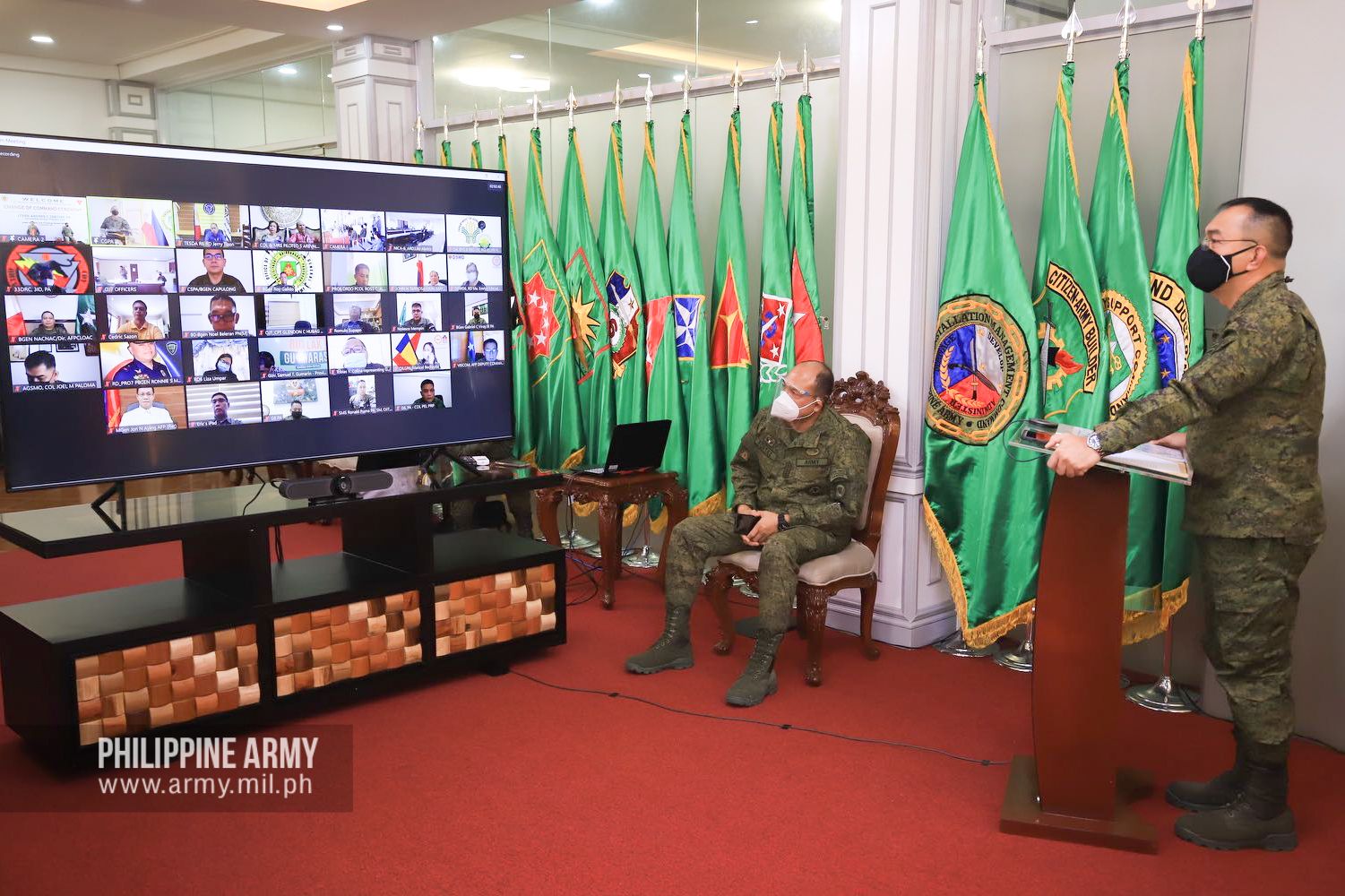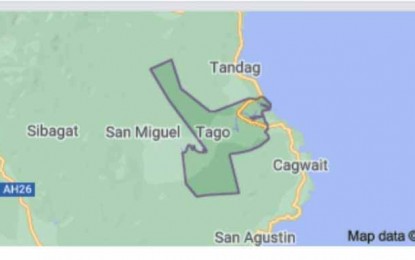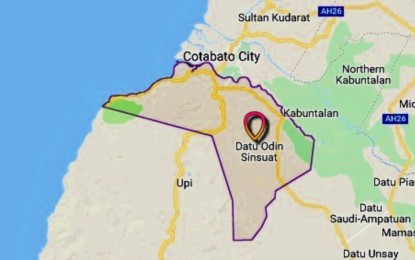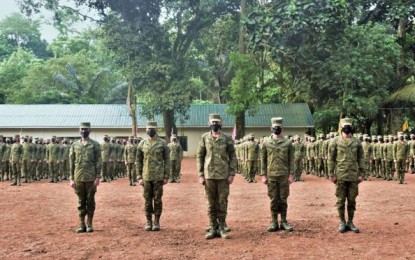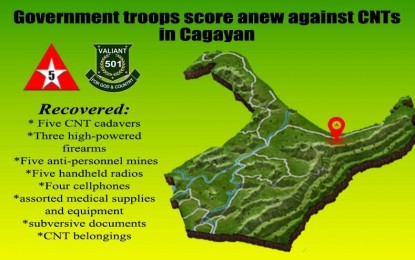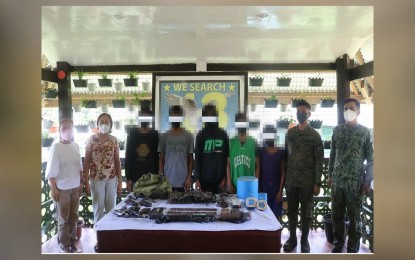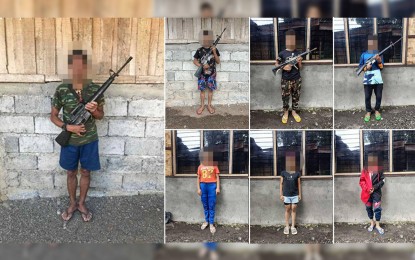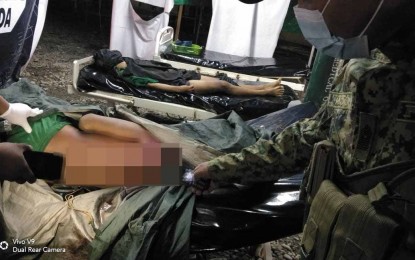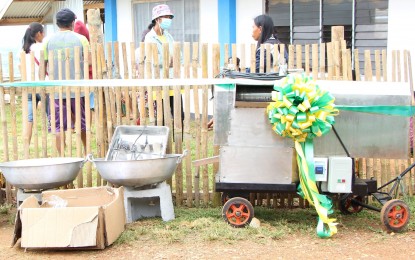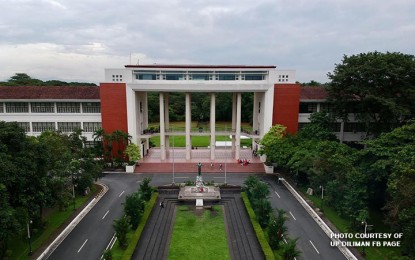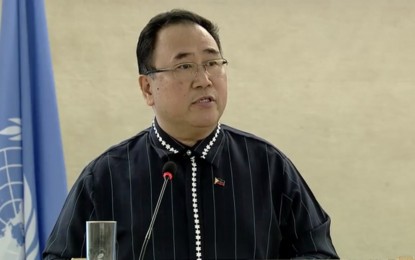Posted to The Diplomat (Sep 22, 2021): How Will the Taliban Affect Violent Extremism in Mindanao? (By Kenneth Yeo)
Violent extremists in the southern Philippines have generally remained aloof from global jihadist currents, but Manila should not be complacent.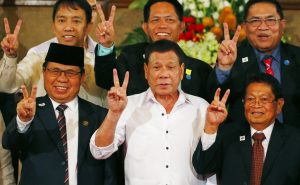 Philippine President Rodrigo Duterte, center, Al-Hajj Murad, left, chair of Moro Islamic Liberation Front (MILF), Ghazali Jaafar, MILF vice-chair, and other leaders flash v-signs for peace during a ceremony for the submission of the draft of the Bangsamoro Basic Law (BBL) at Malacanang Palace, July 17, 2017 in Manila, Philippines.Credit: AP Photo/Bullit Marquez
Philippine President Rodrigo Duterte, center, Al-Hajj Murad, left, chair of Moro Islamic Liberation Front (MILF), Ghazali Jaafar, MILF vice-chair, and other leaders flash v-signs for peace during a ceremony for the submission of the draft of the Bangsamoro Basic Law (BBL) at Malacanang Palace, July 17, 2017 in Manila, Philippines.Credit: AP Photo/Bullit MarquezOn August 16, the Taliban
seized control of Kabul, the capital of Afghanistan. While the Taliban has not demonstrated any intent to lead a global jihadist coalition, the same is not true of its ally
al-Qaida (AQ). AQ was formed in 1998 and rallied Islamists to its cause of waging international jihad against Western targets. It plotted the 9/11 terror attacks in the United States in 2001, which led Washington to declare a global “
war on terror” and pushed it to overthrow the Taliban regime in Afghanistan. Since the Taliban’s reconquest of the country, security observers have raised concerns that it could bring about a global
resurgence of extremist attacks.
Prior to 2001, the Taliban
harbored Osama bin Laden, then leader of AQ. The AQ-Taliban
alliance persists to date, and AQ elements have publicly
celebrated the Taliban’s victory in Afghanistan. As a result, many political pundits are anticipating a
global revival of Islamist terrorism through AQ networks as a result of the Taliban’s victory.
However, the potential increase of terrorism due to the Taliban’s victory in Afghanistan depends very much on the local context. Analysts tend to overlook local counterterrorism capabilities when they are making assessments. A case in point is Mindanao, in the southern Philippines, which might be less affected than other regions due to the absence of AQ elements here and the Philippines’ relatively effective counterterrorism measures. However, terrorism is a transnational threat, and the Philippines must not be overconfident in its local counterterrorism capabilities.
Whether or not the Taliban victory leads to a resurgence of Islamist terrorism depends above all on AQ’s local influence. In Southeast Asia, the Jemaah Islamiyah (JI) has long been AQ’s local conduit. The group has been active since the mid-1990s, and has since established a network across Southeast Asia. The JI was
linked to militant groups in Mindanao including the Abu Sayyaf Group (ASG) and the Moro Islamic Liberation Front (MILF). However, JI’s influence in Mindanao has declined since 2008.
Today, the previously JI-linked MILF is no longer a terrorist group. Since entering peace negotiations with the Philippines government, MILF has purged JI elements from its ranks. These negotiations began in 2008, resulting in MILF being
co-opted to govern the Bangsamoro Autonomous Region of Muslim Mindanao (BARMM) in 2012. MILF militants had since undergone militant
disarmament and reintegrated into society.
Moreover, militant groups in Mindanao tend not to be ideologically aligned to global Islamist forces. They are prone to breaking away from their parent organizations or shifting their allegiance because there is always a radical faction within militant groups that cannot accept engaging in peace talks. The MILF and ASG, for example, split off from the Moro National Liberation Front (MNLF) after the latter accepted a semi-autonomous status from the Philippines government in 1987. Both ASG and MILF appeared to subscribe to the AQ ideology in order to capitalize on the global militant Islamist movement for recruitment and
financial sponsorship.
Today, the region’s active militant groups are no longer aligned with AQ. After the emergence of the Islamic State (IS) in 2014, extremist groups in Mindanao splintered into smaller, more violent outfits aligned with IS. The notorious Maute Group and the Bangsamoro Islamic Freedom Fighters (BIFF) broke away from the MILF after it entered peace talks with the government in 2008. Similarly, Isnilon Hapilon and Hajan Sawadjaan splintered from the Radullan Sahiron-led ASG to form their respective pro-IS factions in 2014.
Overall, AQ’s influence in Mindanao has ebbed due to peace talks and the active groups’ realignment to IS. While there is a possibility of further splintering within active militant groups that produces new alignments with AQ, the weakened militias might not have sufficient strength to pose a substantive threat to the region.
The Philippines authorities have also made significant improvements in their counterterrorism efforts in Mindanao. Islamist groups in the region have been subjected to relentless military assaults, and the Armed Forces of the Philippines (AFP) have made significant territorial gains at their expense. In February 2021, the AFP overran the ASG, BIFF, and Maute bases.
The AFP further weakened militant groups by appealing for active militants to surrender. The government has urged militants to take advantage of
reintegration programs to return to their families. Due to the perception of defeat, there has been an increasing number of militant surrenders in Mindanao since 2019. The reasons cited for defection include starvation, fatigue, disillusionment with leadership, and waning financial support. Hence, instead of aligning with AQ or IS, militants have the third option of
surrendering to the government and receiving an amnesty. Militants from the ASG, BIFF, and Maute Group continue to surrender to the Philippines authorities in large numbers.
There is also no doubt that terrorist groups and networks in Southeast Asia have suffered from COVID-19. The pandemic has impeded terrorist operations in Mindanao. Travel restrictions in many countries has hindered terrorists’ transborder movement. Meanwhile,
nationwide quarantines to curb the spread of COVID-19 has restricted the number of people allowed to congregate in any one place, restricting terrorist targets. With current COVID-19 restrictions, it is difficult for terrorist groups to mobilize, recruit, and coordinate attacks. Therefore, terrorist activity declined significantly since 2019, as reflected in the
Southeast Asia Militant Atlas.
Nonetheless, the Philippines is not out of the woods yet. The United States’ abrupt retreat from Afghanistan raises questions about the trustworthiness of U.S. global leadership in counterterrorism. President Rodrigo Duterte has publicly displayed
anti-American sentiments, and recent events could potentially reinforce his pre-existing skepticism of Washington.
The U.S. has been a significant security partner for the Philippines. Its special operations forces (SOFs) launched
Operation Enduring Freedom-Philippines (OEF-P) in 2002 to support counterterrorism efforts in Mindanao. As the SOFs were prohibited from engaging in combat, they supported the AFP with civil-military operations, information operations, and capacity building under the
foreign internal defense (FID) package.
In February 2020, Duterte threatened to
end its military cooperation with the U.S., though the threat was later
withdrawn. With the Philippines’ recent successes in counterterrorism and Duterte’s waning faith in Washington’s geopolitical leadership, the Philippines may become overconfident in its ability to manage terrorism domestically, and threats to end military cooperation may resurface. Nonetheless, it is still
too early to tell how the Philippines leadership will respond to the U.S. withdrawal from Afghanistan.
The absence of AQ elements and effective counterterrorism efforts in the Philippines have suppressed violent Islamist fervor among the region’s terrorist groups. However, terrorism is a transnational threat and thus requires a multinational strategy. Mindanao had been and continues to have the potential to be a hotspot for training and operations for both JI and pro-IS
foreign fighters in Southeast Asia.
Hence, the Philippines should remain vigilant and take no chances with its counterterrorism policies. The country will need to maintain its existing multinational counterterrorism commitments with the U.S. and other nations in the region if it is successfully to prevent the escalation of terrorism in Mindanao.
[Kenneth Yeo is a Research Analyst from the International Centre for Political Violence and Terrorism Research (ICPVTR), a specialist centre of the S. Rajaratnam School of International Studies (RSIS) based in Singapore.]https://thediplomat.com/2021/09/how-will-the-taliban-affect-violent-extremism-in-mindanao/
